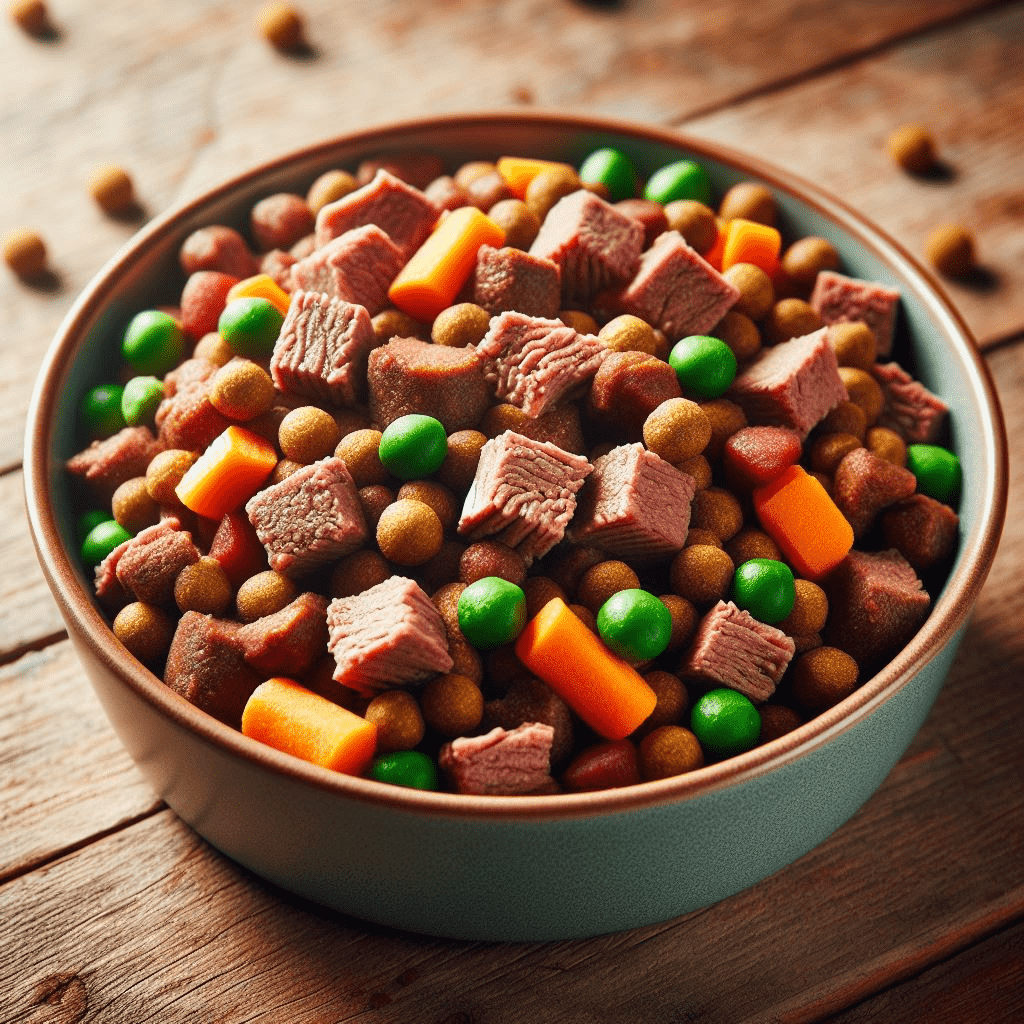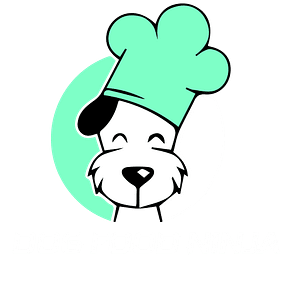It is one of the largest-selling commercial dog food proteins due to its rich flavor and known nutritional value. However, do you go dog-free, or do they truly need beef dog food?
Within this guide, I am going to break down the advantages and disadvantages of carrying corn puppy food items. Dogs also aren’t left in any doubt when producing your choices for their daily diet along with their well-being.

Table of Contents
Toggle1. Is Chicken Or Beef Kibble Better For Dogs?
When it comes to choosing the right kibble for your dogs, the debate between chicken and beef often arises. Both protein sources offer unique benefits and considerations for your dog’s diet. Let’s explore the factors to consider when deciding whether chicken or beef kibble is better suited for your canine companion.
2. How To Cook Beef For Dogs?
Cooking beef for your dog is a straightforward process, but it’s essential to follow some guidelines to ensure the meat is safe and nutritious for your furry friend. Here’s a step-by-step guide on how to cook beef for dogs;
1: Preparation;
Start by washing your hands and all utensils thoroughly to prevent cross-contamination.
Trim any visible fat from the beef, as excess fat can be difficult for dogs to digest and may cause gastrointestinal upset.
Cut the beef into bite-sized pieces or strips, depending on your dog’s Size and preferences.

2: Cooking Methods;
There are several cooking methods you can use to prepare beef for your dog:
3: Boiling;
Place the beef pieces in a pot and cover with water. Bring to a boil, then reduce heat and simmer until the beef is fully cooked. Boiling is a simple method that helps retain moisture in the meat.
4: Grilling Or Pan-Searing;
Heat a grill or skillet over medium-high heat.
Cook the beef pieces for a few minutes on each side until they are browned and cooked through.
Avoid using added oils or seasonings, as some ingredients may be harmful to dogs.
5: Baking;
Preheat the oven to 350°F (175°C).
Place the beef pieces on a baking sheet lined with parchment paper.
Bake for 15-20 minutes or until the beef is cooked to your desired level of doneness.
6: Seasoning;
It’s best to avoid seasoning the beef with ingredients like salt, garlic, onions, or spices, as these can be harmful to dogs. Stick to plain, unseasoned meat to ensure your dog’s safety and well-being.
7: Cooling And Serving;
Allow the cooked beef to cool completely before serving it to your dog. It helps prevent burns and ensures the meat is safe to eat. You can serve the beef as a standalone treat or mix it with other dog-friendly ingredients, like cooked vegetables or rice for a balanced meal.
8: Storage;
Store any leftover cooked beef in an airtight container in the refrigerator for up to three days. You can also freeze cooked beef for longer-term storage. Be sure to thaw frozen meat in the fridge before serving it to your dog.
3. Is Cooked Beef Good For Dogs?

Yes, cooked beef can be a beneficial addition to a dog’s diet for several reasons:
Protein Source: Cooked beef is a rich source of high-quality protein, essential for muscle growth, repair, and overall body function in dogs. Protein is crucial for maintaining healthy tissues, organs, and immune function.
Nutrient Content: Beef contains essential nutrients such as iron, zinc, B vitamins (including B12 and niacin), and selenium, all of which are important for a dog’s overall health and well-being. These nutrients support various bodily functions, including metabolism, energy production, and immune system function.
Palatability: Many dogs find the taste and smell of cooked beef highly appealing, making it a favorite food choice for them. Its palatability can encourage dogs to eat and enjoy their meals, especially for picky eaters or dogs with reduced appetite.
Digestibility: Cooking beef helps to break down proteins and fats, making it easier for dogs to digest and absorb nutrients. It can be particularly beneficial for dogs with sensitive stomachs or digestive issues, as cooked beef is less likely to cause gastrointestinal upset compared to raw meat.
4. Can Dogs Eat Beef Raw Food?

For sure, some dogs like raw beef, but we have to remember the potential dangers of feeding this kind of meat to our pets. Some Key Points to consider:
Bacterial Infections: As with any raw meat, raw beef can contain dangerous bacteria such as Salmonella, E. coli, or Campylobacter. If consumed by either dogs or humans, these bacteria can be harmful.
Parasites: Parasitic worms are an issue with raw meat, especially beef. When dogs eat these parasites, it can cause infections that result in medical illnesses.
Nutrient Deficient: a diet high in raw beef (particularly if unbalanced with sufficient essential nutrients) causes an imbalance of nutrition. Dogs are meant to get a variety of nutrients from different sources for optimal health. If not well supplemented or varied, they can cause deficiencies.
5. The Benefits Of Beef Dog Food:
| Benefits | Description |
| High-Quality Protein | Beef is a rich source of high-quality protein, crucial for building and repairing tissues, maintaining muscle mass, and supporting overall growth and development in dogs. |
| Nutrient-rich | Beef contains essential nutrients such as iron, zinc, B vitamins, and omega-6 fatty acids, contributing to your dog’s overall health and vitality. |
| Palatability | Many dogs find the taste of beef highly palatable, making it an excellent option for picky eaters or those with decreased appetite. |
| Variety | Beef dog food provides variety in your dog’s diet, preventing mealtime boredom and ensuring they receive a diverse range of nutrients. |
6. Considerations When Choosing Beef Dog Food:
| Considerations | Description |
| Quality Matters | Option for high-quality beef dog food made from real meat and wholesome ingredients. Avoid products containing fillers, by-products, artificial additives, or excessive preservatives. Choosing a high-quality ingredients ensures that your dog receives the essential nutrients they needs without unnecessary additives or low-quality ingredients that may be detrimental to their health. |
| Allergies and Sensitivities | Some dogs may have allergies or sensitivities to beef protein, leading to digestive issues, skin problems, or allergic reactions. Monitor your dog closely for any adverse reactions when introducing beef into their diet. If any signs of allergy or sensitivity appear, consider switching to an alternative protein source or consulting with your veterinarian for guidance. Your veterinarian can help identify the underlying cause of your dog’s reaction and recommend suitable dietary adjustments or hypoallergenic options. |
| Breed and Size | Consider your dog’s breed, size, age, and activity level when selecting beef dog food. Active dogs may require higher protein content, while senior dogs or those with specific health conditions may benefit from specialized formulas. Large breeds may require additional joint support, while small breeds may need smaller kibble sizes for easier chewing. Tailor your choice to meet your dog’s individual needs and nutritional requirements to support their overall health and well-being. |
| Consult Your Veterinarian | Before making any significant changes to your dog’s diet, consult with your veterinarian. They can provide personalized recommendations based on your dog’s individual needs, ensuring their dietary requirements are met. Your veterinarian can also help identify any specific health concerns or conditions that may require nutritional modifications or specialized nutrition. Trust their expertise to guide you in providing the best care for your dog and addressing any dietary concerns effectively. |
7. Is Beef Dog Food Good For Dogs With Allergies?

Beef dog food may not be suitable for dogs with allergies, as beef is a common allergen for some dogs. Allergies in dogs can manifest as skin issues (such as itching, redness, or rashes), gastrointestinal problems (including vomiting or diarrhea), or respiratory symptoms (like sneezing or coughing).
Consider alternative protein sources that are less likely to trigger an allergic response, such as:
Novel Proteins: Novel protein sources are protein options that your dog hasn’t been exposed to before, reducing the likelihood of an allergic reaction.
Hydrolyzed Protein Diets: Hydrolyzed protein diets contain proteins that have been broken down into smaller, less allergenic fragments, making them easier for dogs with food allergies to tolerate.
Limited Ingredient Diets: Limited ingredient diets feature a simplified ingredient list, often containing a single protein source (such as lamb or turkey) and a limited number of additional ingredients. These diets can help identify and avoid specific allergens.
Grain-Free Options: Some dogs may have sensitivities to grains, which can exacerbate allergy symptoms. Grain-free dog foods focus on alternative carbohydrate sources like sweet potatoes or peas, which may be more suitable for dogs with grain allergies.
Conclusion:
Beef dog food can be a nutritious and flavorful option for your canine companion, providing essential protein and nutrients for optimal health. However, it’s crucial to choose high-quality products, consider your dog’s individual needs, and monitor for any adverse reactions. By making informed choices and prioritizing your dog’s well-being, you can ensure they thrive on a balanced and wholesome diet. Remember, when in doubt, consult your veterinarian for guidance tailored to your dog’s specific requirements.
FAQ’s:
Which Is Better For Dogs, Beef Or Chicken?
Chicken is a good protein for dogs because it has less fat. It’s great for dogs trying to manage their weight or those with sensitive stomachs. On the other hand, beef has more fat. It can be good for active dogs who need lots of energy, but it might make some dogs overweight or cause tummy troubles.
Should Dogs Eat Beef Dog Food?
It’s okay for dogs to eat lean beef. Lots of dog foods have beef in them. Beef gives dogs protein and important vitamins and minerals that keep them healthy. Just make sure the meat you give your dog is plain, without any extra sauces or seasonings.
Is Beef Easy To Digest For Dogs?
Some foods are easier for dogs to digest. Fish is the easiest, then chicken (if your dog can handle it). After that, there’s lamb, beef, and pork.

